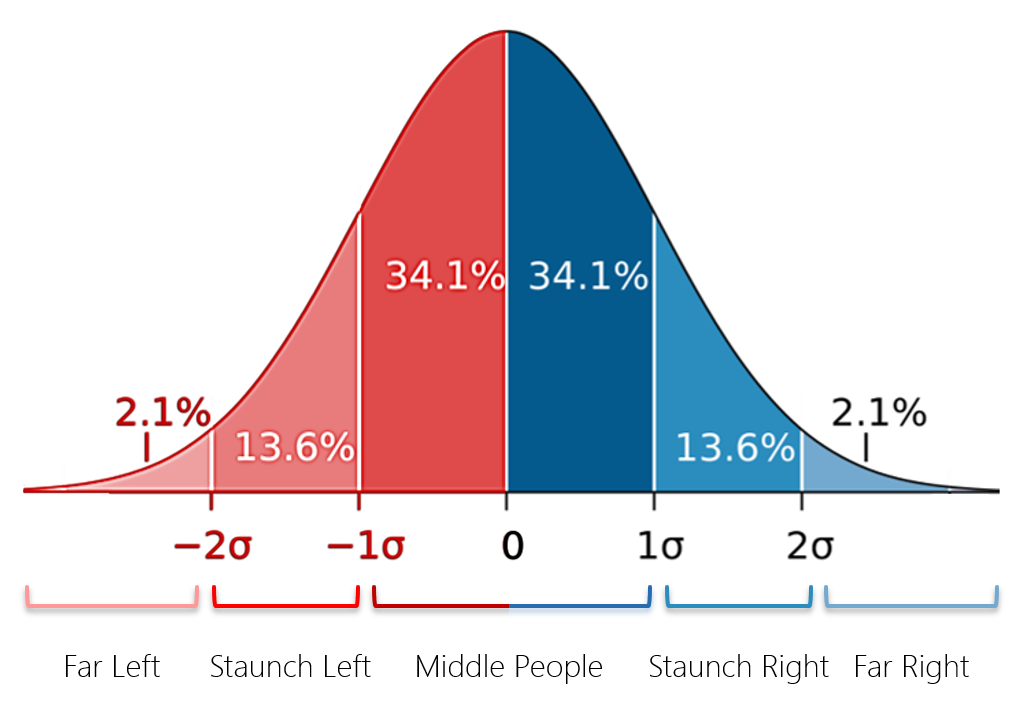Former mayor of New York, Ed Koch, used to say “If you agree with me 9 out of 12 times, vote for me. If you agree with me 12 out of 12 times, see a psychiatrist.” Good advice that still applies today. Granted this came from a time when politics was sorta fun and nobody knew everything, but the part about mental illness is quite telling.
Back in the day, few of us were politically motivated. Citizens were chill about governance and only a smattering read the news. We trusted leaders. Sure they lied to us, but that was understandable since no simple commoner could relate to smarter people’s thoughts? But things have changed. Now we have big opinions based on small amounts of knowledge and a style of propaganda that really sells.
Before getting to mass media and psychological warfare, let’s start with how things used to work:
Middle people
Grab any bell curve and you’ll see 68%, or two-thirds of us, land smack dab in the middle. That’s where regular people fit and it makes sense. How could any society operate without some form of consensus? Of course, we still had the staunch but they were just nerds in need of personalities. No cool person would ever waste time associating with civics.
And back then parties worked together. It wasn’t like one was extra mean or confused. Everybody knew where we were headed. Growth and efficiency provided the cash, and governments spent it—affording everyone a better standard of living. Then when education jarred us away from older day thoughts, governments granted us more freedoms. It worked.
Plus we had far-people to push the conversation. Many social and economic issues needed to be addressed and outlier voices were respected. Why not? Didn’t we want a better society? Many of the policies you enjoy today started on the fringes. But advocates and voters always knew their place. The far-minded were never intended to rule because single purpose warriors aren’t equipped to govern. Anyway, things have gone sideways.
Flattening the curve
Commerce cougars like myself blame MBAs for ruining the business world. Doling out credit to folks who can’t afford it is one of many dishonourable ideas invented in the name of results. This stupidity has encountered the voter. The first rule of political strategy is now to flatten the curve. Yes, move middle people into the category of staunch so you can always count on their vote. And sure, it’s okay to market for only one side but the dinks who run these campaigns have started a new style. One that attacks people’s minds.
Jonathan Haidt breaks it down to good versus bad. He claims propaganda artists now sell us into believing their product is of the good. And what’s better than that? You’re a superhero, donning his or her cape to join the noble quest. Sounds fine, except politics was designed to be adversarial. Viewpoints are supposed to be argued over. It’s the way forward.
Gabor Maté, a world expert on addictions, says it gets worse. He claims voters have become addicted to ideology. Not because of identity but for the sake of purpose (as per Frankl). Finding meaning in life fills a natural void inside us. Previously found in raising a family and doing a good job, purpose now includes which party you vote for. So yelling, “I hate Jason Kenney” is better than being a fan of the Oilers. Anyone can cheer for hockey. Only “the good” hate opposition politicians. And actions like these go beyond mere identity–they’re deeper. These attacks make me an honourable member of society. They say I have ethics. (Weird.)
Political marketers know exactly who they’re dealing with. People. People who may be skilled in certain areas but haven’t put much effort into poli sci. People who crave belonging (as per Maslow), while requiring a purpose-based identity. And people who needn’t study before exclaiming a strong remark (as per Kahneman). The dinks are making fun of us. It’s psychological warfare and we are the pawns.
Summary
So here we sit. Since humans require identity and purpose, political followers now believe that half of us are bad. Years ago, when everyone was chill, we were all pretty good. But today it’s only 50%. Why? Because I need to be good. So much so that I’m ideologically bound and will wither without social confirmation. So if you put forth a notion contrary to my unethically biased publication that barely scratches the surface–without considering anything from the other side–then due to my innate laziness, I see only one path forward. You bad!
Let’s end with a secret. Nice people don’t hate and they never punch people in the face. More so, they don’t revel in negative vibrations or enjoy feeling this way. Nice people also don’t question a neighbour’s ethics for favouring a different position. They may ask why but never judge. And nice people put time into strong positions. Plato said life is a constant battle between inner animal and reason—and reason must win. In the end, either everyone is nice or it’s none. Because we’re basically the same. Ordinary, everyday, middle people.
Note: This is the last in a series of articles on this topic. Others are God is Dead?, Fake News, Tribalism, and Hate.
